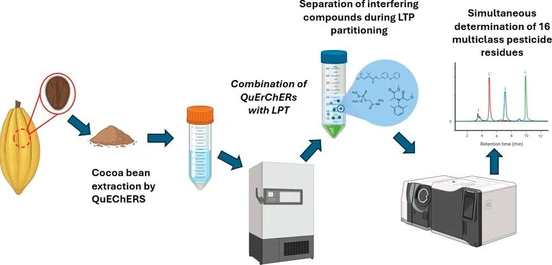Automating Biodiesel Quality Testing With Gas Chromatography (GC)

- Photo: Thermo Fisher Scientific: Automating Biodiesel Quality Testing With Gas Chromatography (GC)
- Video: Thermo GCMS: Thermo Scientific - Automated FAMEs Sample Prep with the TriPlus RSH Autosampler
In recent years, the use of biofuels, such as biodiesel, has increased as a clean and renewable alternative to conventional fossil fuels, representing a sustainable way to lower greenhouse gas emissions. Biofuels are created from biomass, such as food crops, plants, and more recently from algae, or waste products. The usage of biofuels has been expanding quickly, as businesses and industries throughout the world invest in the technology to lower their carbon footprint and meet renewable energy targets.
 Thermo Fisher Scientific: Automating Biodiesel Quality Testing With Gas Chromatography (GC).
Thermo Fisher Scientific: Automating Biodiesel Quality Testing With Gas Chromatography (GC).
Biodiesel production
Widely used fuel-grade biodiesel is made from vegetable oils (e.g., rapeseed, soybean, palm oil) through the chemical process of transesterification with alcohol (typically methanol), whereby glycerin is separated from the resulted mixture of free fatty esters (biodiesel).
Once separated from glycerin, biodiesel can be blended with petroleum diesel in various concentrations, labeled as BXX, where XX represents the percentage of biodiesel in the mineral diesel. Typically, it can be used at a concentration of 5 percent (B5) up to 20 percent (B20) in diesel engines with little or no modifications.
Biodiesel (B100) quality is critical to ensure a safe and satisfactory engine operation, therefore, during the production process it is important that reaction conversion yield, removal of glycerol, absence of polyunsaturated fatty acids (PUFA), removal of alcohol and absence unreacted glycerides are monitored.
 Thermo Fisher Scientific: Automating Biodiesel Quality Testing With Gas Chromatography (GC): Transesterification reaction for biodiesel production.
Thermo Fisher Scientific: Automating Biodiesel Quality Testing With Gas Chromatography (GC): Transesterification reaction for biodiesel production.
The American Society for Testing and Materials (ASTM) and the European Standards (EN) have published analytical methods that are widely adopted to characterize impurities in pure biodiesel (B100) by using gas chromatography (GC) coupled to flame ionization detection (FID):
EN 14105 /ASTM D6584
Standard methods / Relevance
- Determination of residual free and total glycerol and mono-, di-, triglyceride content: Unreacted glycerides and free glycerol are critical for engine injector clogging and fouling compounds formation
EN 14103
Standard methods / Relevance
Determination of total FAMEs (Fatty Acid Methyl Esters) and linolenic acid methyl ester (C18:3) content: FAME content is a measure the reaction yield and allows accurate calculation of the cetane index of biodiesel
EN 14110
Standard methods / Relevance
Determination of residual methanol: Small amount of residual methanol can reduce the flash point of biodiesel, potentially affecting the safe operation of fuel pumps, lifetime of seals and elastomers, and resulting in poor combustion
Biodiesel analyzer: comprehensive quality check with one automated system
Each of the standard methods requires specific GC conditions, calibration set up and sample preparation procedures, typically approached with different GC systems and manual sample handling. Especially the analysis of glycerol and unreacted mono-, di-, triglycerides requires complex and time consuming sample derivatization and complex calibration set up.
To face the high throughput demand of analytical laboratories, a multimethod approach for the analysis of biodiesel samples can be achieved by operating a Thermo Scientific™ TriPlus™ RSH SMART robotic autosampler in Clone Mode configuration, allowing it to serve two Thermo Scientific TRACE™ 1610 GC systems. The TriPlus actss as two independent autosamplers, so that different samples can be automatically injected into two GCs — one dedicated to glycerol analysis due to the high oven temperature that has to be reached — and one dedicated to methanol and FAME determination.
The automation capability and versatility of the TriPlus RSH SMART autosampler is used to execute derivatization protocol as well as calibration setup with internal standard addition, for all the standard methods, followed by injection into the GC systems.
This comprehensive solution for biodiesel analysis is ideal for laboratories performing quality control and production process monitoring, and looking to improve productivity with confident results.
 Thermo Fisher Scientific: Automating Biodiesel Quality Testing With Gas Chromatography (GC): TriPlus RSH SMART autosampler configured for automated sample preparation and calibration setup, serving two TRACE 1610 GC systems, one dedicated for EN14105/ASTM D6584 and one dedicated to EN14103/EN14110.
Thermo Fisher Scientific: Automating Biodiesel Quality Testing With Gas Chromatography (GC): TriPlus RSH SMART autosampler configured for automated sample preparation and calibration setup, serving two TRACE 1610 GC systems, one dedicated for EN14105/ASTM D6584 and one dedicated to EN14103/EN14110.
Automation for calibration standards, sample derivatization, and internal standard addition, reduces the risk of errors and cross-contaminations, delivering highly precise and reliable analytical results. Automation also allows for unattended operations, saving analysts valuable time as well as limiting analysts’ exposure to the toxic reagents typically used in biodiesel sample derivatization protocols.
Dr. Daniela Cavagnino
Dr. Daniela Cavagnino is global Product Marketing Manager for GC and Autosampler/front-end solutions at Thermo Fisher Scientific. She received her Master's Degree in Chemistry at the University of Milan, Italy. She started her career in gas chromatography spending several years in R&D laboratories working on GC technology innovation. She then conveyed her technical background into product management and marketing management roles with more than 20 years' experience in promoting GC/GC-MS technology and applications in several different market segments. During her career, she has participated as author and co-author in technical publications and actively operated as lecturer at international conferences.
Additional resources
- Thermo Scientific AN001897 – Biodiesel quality assessment: an automated approach for analysis of free and total glycerol content in biodiesel (B100), according to the EN 14105 and ASTM D6584 methods.
- Thermo Scientific AN001898 – Biodiesel quality assessment: characterization of residual methanol in finished biodiesel (B100) by headspace sampling according to EN 14110.
- Thermo Scientific AN001899 – Biodiesel quality assessment: determination of esters and linolenic acid methyl ester content in biodiesel (B100) by GC-FID, according to EN 14103
- Thermo Scientific EB000396 – Guide to automated sample preparation workflows for GC and GC-MS




